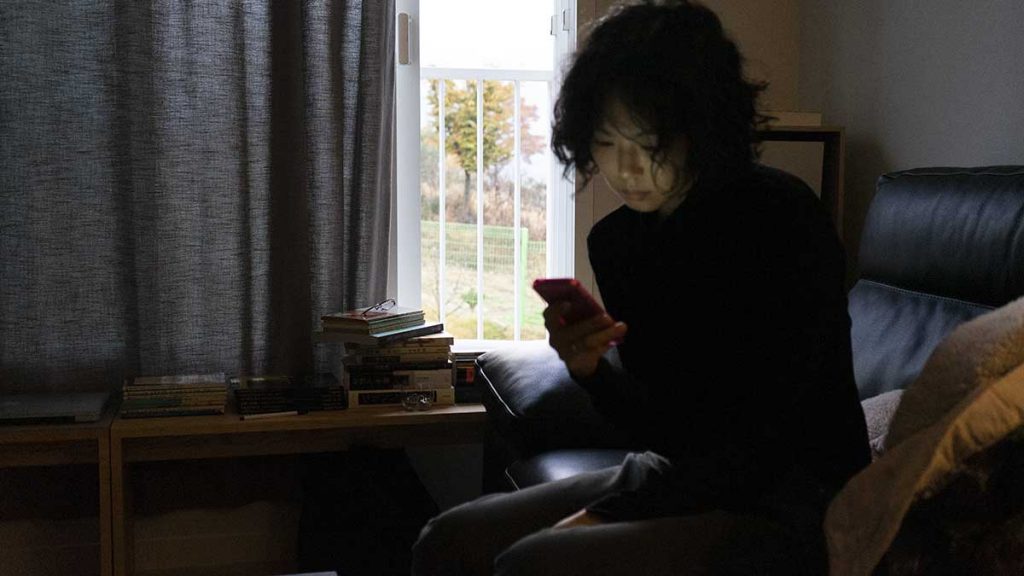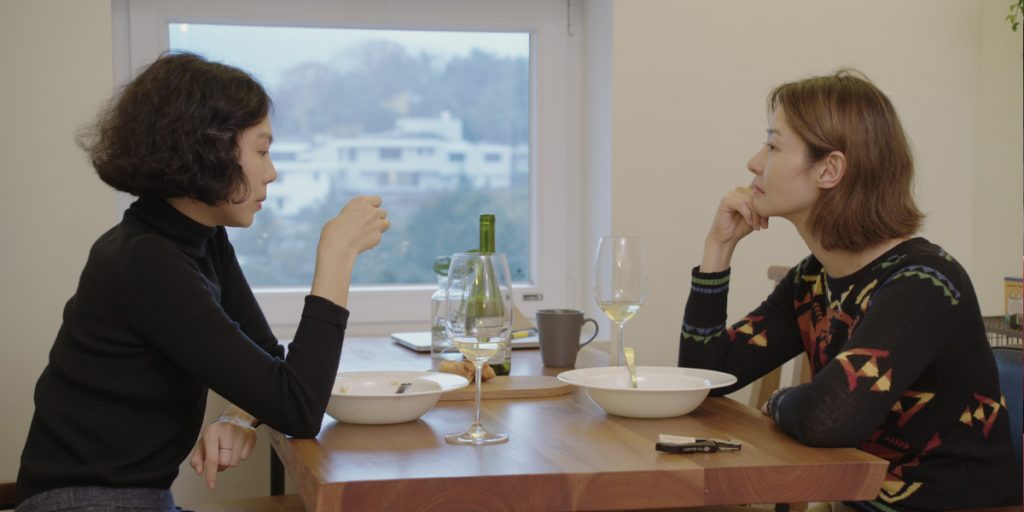The Woman Who Ran plays like a leisurely stroll through familiar friendly spaces and feels like a journey of self-discovery in which all stress melts away.
Close your eyes and imagine a scenario. For a couple of days, you have no responsibilities. Everything that comprises your life on the Earth has left you be for those two days. After years of being an entity in a functioning system, you’re just a person without any pre-defined immediate purpose. You’re free to do anything. So you decide to find out what other lives you may have missed out on over the years, or try to understand what about your circumstance has been seeming off for quite some time. You take a stroll down familiar roads while listening to soulful music and suddenly feel a sense of calm descending on yourself as the familiarity gives way to an exciting catharsis.
You gradually feel more like yourself after having settled into a somewhat mundane and not necessarily very fulfilling existence for a long time. After revisiting friends you haven’t seen in ages, you sit on the beach and watch the waves, and feel the exhaustion sink in as you prepare to go back to your life. But you also understand yourself better, and you might know what to do differently from the following day, having spent some much-needed time looking at life outside yours and with yourself. Do you feel a certain rejuvenation, despite no real prospect of not staying stuck in your semi-satisfying existence you got a little break from? The Woman Who Ran is a cinematic expression of that feeling.
The film tells the story of Gamhee (Kim Minhee), a married woman who decides to venture away from home when her husband is away on a business trip. She visits old friends whom she probably hasn’t seen since being married, although that isn’t confirmed. She first shows up at the house of Youngsoon (Seo Younghwa) with meat which Youngsoon’s roommate Youngji (Lee Eunmi) grills for them for lunch. Their afternoon conversation is interrupted by the man who’s recently moved in as a neighbour (Shin Seokho) complaining about cats in the neighbourhood. After spending the night there, Gamhee visits another friend, Suyoung (Song Seonmi), who lives alone in an apartment with an amazing view of Mount Inwang.
They have lunch and then they’re interrupted by a young poet (Ha Seongguk) whom Suyoung once slept with, pleading for some time to talk with her. After leaving Suyoung’s place, Gamhee sits in a café where she unexpectedly meets another friend, Woojin (Kim Saebyuk). After a talk about something that happened in their past, Gamhee reveals she’s there to watch a film at the local theatre. After seeing the film, she meets with Woojin again, and it turns out she’s the one who manages the theater.
They talk about Woojin’s marriage with Mr. Jung (Kwon Haeyo), who is a famous writer who Gamhee knew long back and has recently seen on television. After she steps out to leave, Gamhee finds Mr. Jung standing outside, smoking. They have a short, somewhat awkward conversation which Gamhee cuts off midway before heading out another way and finally deciding to watch the movie again. As the scene of waves crashing on a beach plays on the screen of the theater she’s sitting in, the credits of The Woman Who Ran appear on screen while the soulful film score plays.
Some might consider me to have essentially spoiled the film by describing the story from start to finish, but that’s the magic of Hong Sangsoo’s latest feature – the substance lies in the spaces between the plot points. It’s majorly a conversational piece and even the conversations are very commonplace – feeling authentically like people who haven’t seen each other for a long time are finally reconnecting. There isn’t a lot of depth in the discussions, but it’s what’s unsaid that speaks volumes. For example, each of the three friends Gamhee meets has had a different experience with romantic relationships, and the contrast with Gamhee’s stable marriage is subtly made a focal point in the narrative. Early in the film, she tells Youngsoon that, in the five years that she’s been married, this is the first day she’s spent away from her husband.
She insists that’s what her husband wanted because he believes people who love each other should stick together always. She says this in a particularly mechanical way which is really foreboding, and, while the screenplay doesn’t allow for much space around this declaration before Youngsoon’s reaction to it, the seeds of doubt about Gamhee’s personal satisfaction with her life have been sown in the viewers’ minds. It’s essentially the space between words and the flow of dialogue that carries true meaning in the film, apart from some genuinely insightful lines in the script.

The Woman Who Ran has to be a divisive film. You’ll either be bored by it due to the lack of action or a seeming lack of accessibility, or you’ll fall in love with it and adopt it as a comfort zone to revisit many times later. Hong Sang-soo’s writing seems to be aware that it is a niche project not meant for reaching everyone, because there’s a certain laziness in the flow of the narrative. For a film with as small a runtime as 77 minutes, The Woman Who Ran is rather contemplative. Just like an actual break from five years of constantly being in a marriage which may even be fulfilling and loving, would consist of leisurely strolls because Gamhee’s finally left to herself, the film is composed of leisurely segments seamlessly blending with each other to tell a story. Each conversation has segments that are repeated, but it doesn’t necessarily feel boring because this adds authenticity. You’ll feel like a quiet participant or at least an active observer and this makes this film engrossing despite the seemingly boring premise.
Kim Sumin’s cinematography contributes to the laidback summery vibe of the film’s dialogue flow. The camera is primarily still and there are a few zoom-ins and a couple of very slow panning shots. No one’s essentially in a hurry in the film and neither is the camera, and that’s why, within a few minutes, neither is the viewer’s mind. If you can get into the mood of the film, you’ll have adopted the laziness yourself. The free-flowing informality in the conversations of friends who were close once, even if they’ve not met in a long time, can be found even in the shots of nature. For example, there’s a zoomed-in shot on the face of a yawning cat. And then there’s a shot of a man in a longcoat walking along the road during the rain. There are also some breathtaking shots of Mount Inwang. Even the times that the camera zooms in on frames where there are two or three people talking with each other, the motion seems whimsical, because there’s really nothing specifically focused on. While that’s erratic, it’s not chaotic, but rather meandering because the lack of intent adds a certain dreaminess to the visuals.
Every performance is brilliant, but Kim Minhee stands out, and not just because she gets the most screen time, which allows her more space to show off her acting talents. She’s extremely composed as Gamhee, barely betraying anything, embodying the character’s possible self-consciousness about expressing something she herself isn’t sure about. Her smile is also reserved, but her eyes sparkle, expressing that Gamhee is actually very glad to see her friends and be away from her regular life, but she doesn’t want to show that much because she feels the obligation to her marriage to ensure it comes across as fulfilling enough. This is entirely subtext really, but I feel like Kim’s performance is layered and this interpretation isn’t very inaccurate. Kim’s expressions at the end when Gamhee watches the sea on the theater’s screen shift very subtly and that I believe captures Gamhee’s essence the best. She just is a reserved person and even alone she doesn’t emote a lot, and so Kim’s composure with the role is a really rewarding watch.
Another major virtue of the film is its refreshing take on feminism. It doesn’t declare war on patriarchy and there isn’t a single preachy monologue about toxic masculinity, but the theme is present. Firstly and most clearly, the role of the men in the film is negative. The first two times, they’re interrupting and annoyingly persistent about their perspective. The stubbornness is beautifully written, forming a contrast with the personality of the woman the argument is with. In the first case, the man nags about cat infestation with arguments that virtually border on wanting to control an aspect, however small, of Youngji and Youngsoon’s lifestyle. In the second case, Hong has written Suyoung’s side of the conversation with a ferocity about her that really complements her lifestyle. She’s uncompromising because of past experiences with men and her conviction in her right to be adamant here. And finally, Gamhee’s own conversation with Mr. Jung, the last few lines of the film itself – the woman is uncomfortable but the man flaunts his lack of discomfort and the critique of macho energy here is both explicit through Gamhee’s words and through subtext. Overall, this take on feminism which is more quiet, internal and personal, is refreshing after the barrage of confrontational films in recent times.
Finally, there’s the title. Who really is The Woman Who Ran? There’s really nothing conclusively explained about that. Each of the friends Gamhee meets has some lack of fulfillment and are each coping in their own way, and it’s not clear who the title refers to. Even Gamhee herself isn’t necessarily running away from anything. One repeating shot however comes to mind in that context. In both Youngsoon and Suyoung’s apartments, there’s a scene in which Gamhee, when alone in the room, opens the window and looks out at the mountain with a meditative look on her face, somewhat similar to her expression when she was seeing the sea waves in the film she watched. Maybe this is an expression of her yearning to run away to live other versions of her life before it ends, maybe it’s a yearning for her husband whom she misses, or maybe it’s just a quiet moment of reflection as she contemplates on what she found out about her friend and where she stands with herself. It’s just to answer the question with which I started this paragraph that watching the film is worth it, but there are, of course, many more virtues. My favourite aspect of it is how it’s like a comfort zone I can retreat to.
The Woman Who Ran was released exclusively on MUBI on February 11, 2022. Read our review of Hong Sang-soo’s A Traveler’s Needs!

